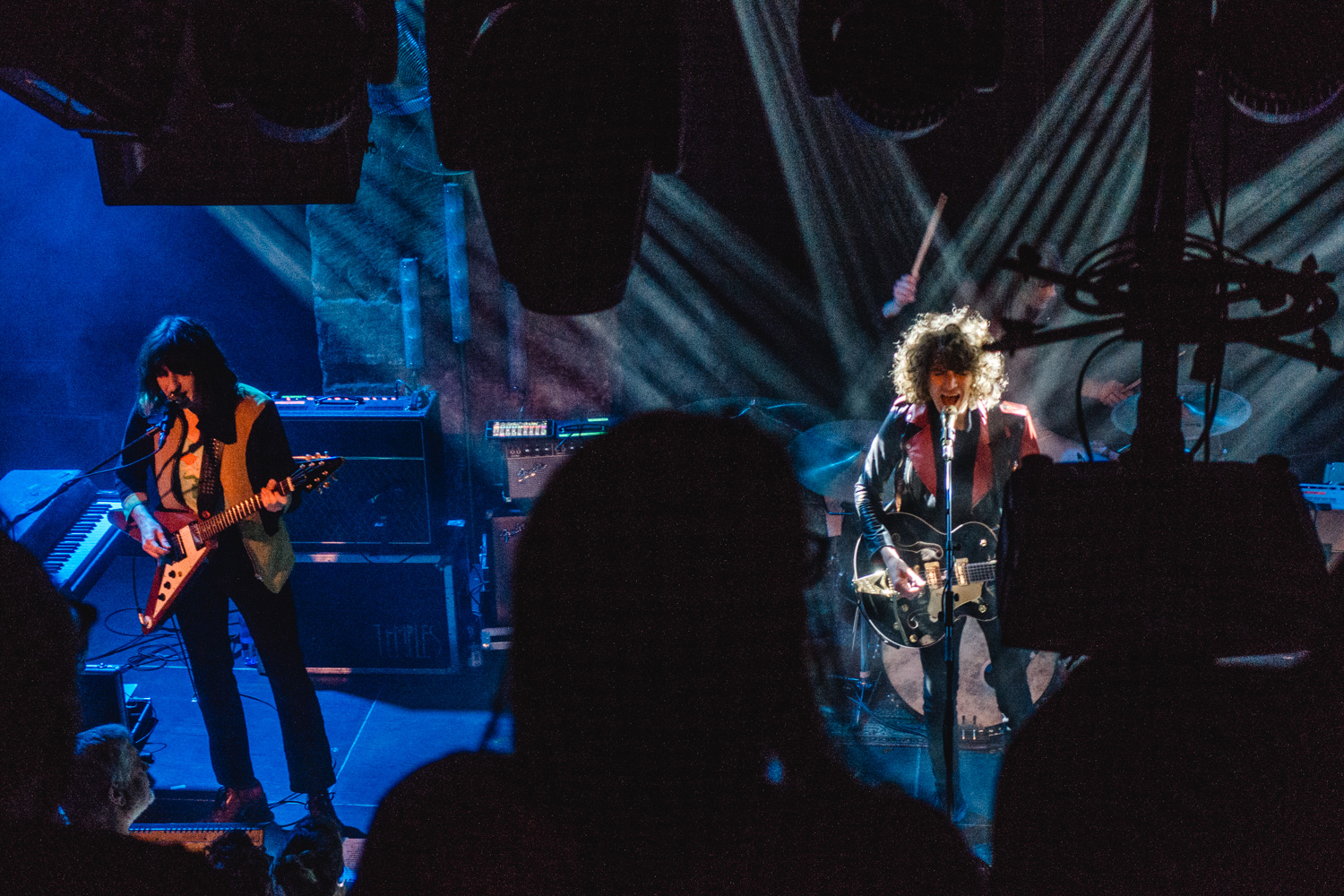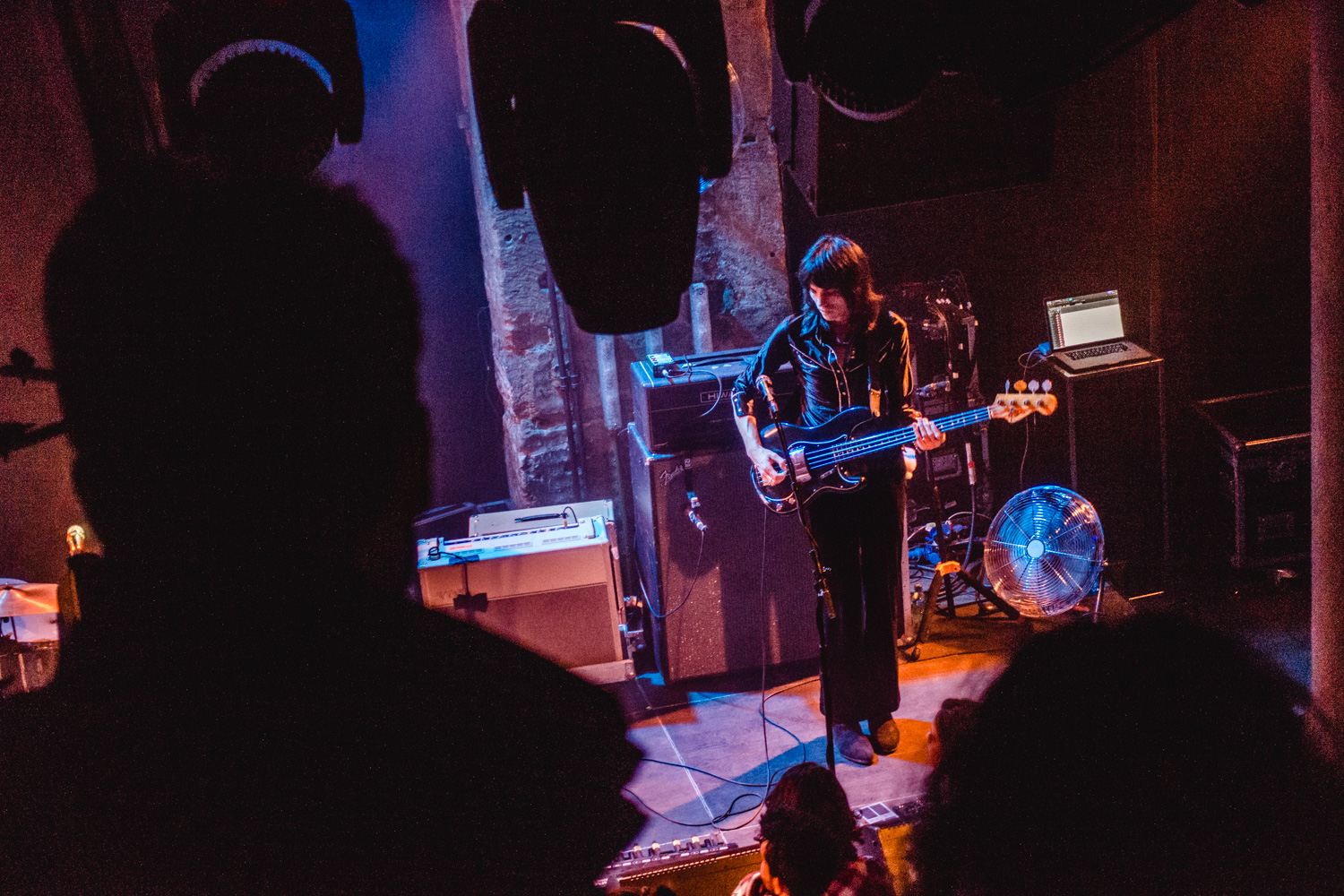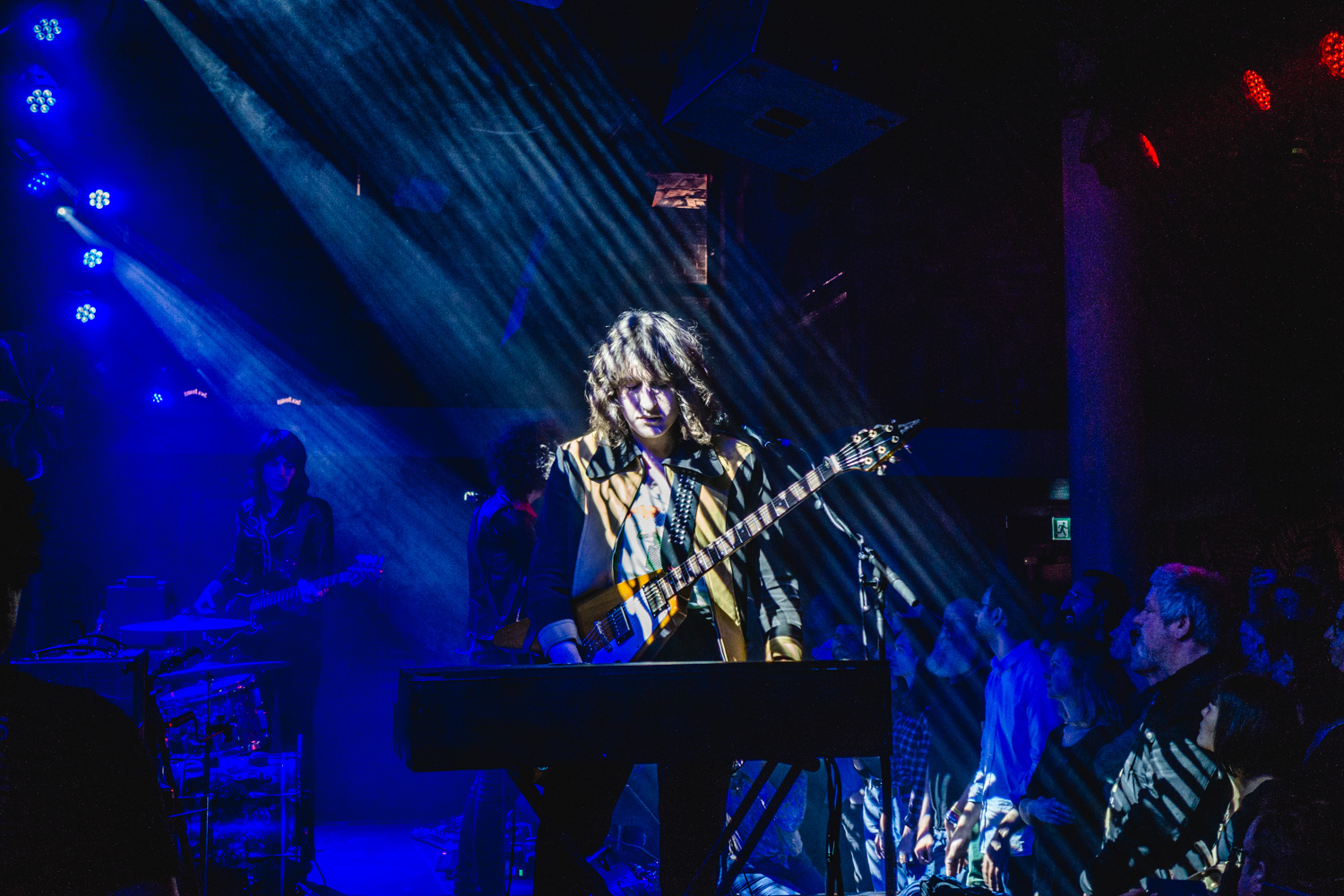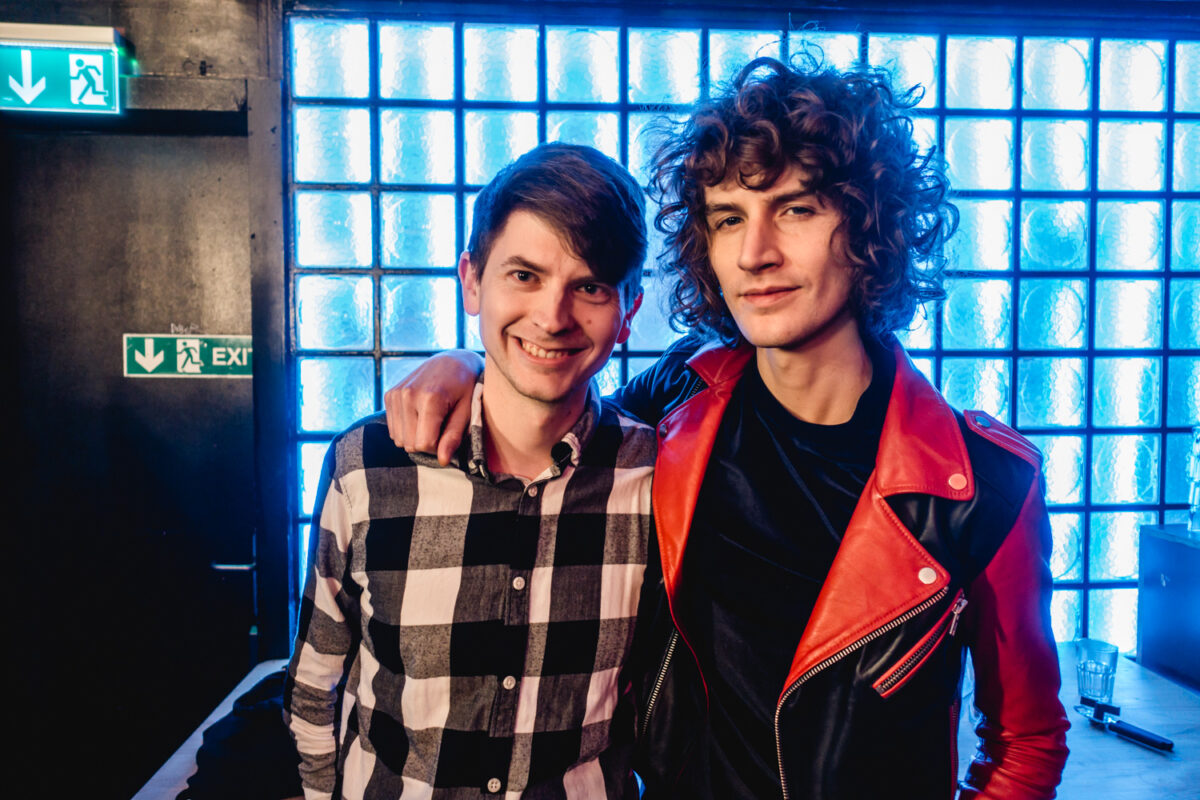Temples are currently touring with their third record «Hot Motion». Last Friday they made a single stop in Switzerland to play at the Mascotte Club in Zurich. Ahead of the gig, singer James Bagshaw talked about his songwriting, the imagery of the band and why he was offended by the latest announcement of Coldplay that they won't tour their most recent album.
Temples are:
James Bagshaw (lead vocals, lead guitar)
Adam Smith (rhythm guitar, keyboards, backing vocals)
Tom Walmsley (bass, backing vocals)
Rens Ottink (drums)
Indiespect: I would like to start with a quick look back. I was a bit shocked when I read that your second record «Volcano» wasn’t that well received as imagined because I really liked it. Did that circumstance influence you to change the approach for «Hot Motion»?
James Bagshaw: Yes, I think so. That is a good question. When we made Volcano we wanted to make something very very different to the first album. We didn’t want to be typecast to be a retro band. Also, when we made Sun Structures we didn’t have a fanbase. No one heard our music until we started playing gigs whereas we had a fanbase after that, so there’s added pressure. When we did Volcano, maybe we overthought about the songs. I still think it’s a good album but this time we made it completely for us which is how we made the first album. It made us definitely act more instinctively and not think about anybody ever hearing it. I think, that was the key.
Indiespect: You once said that with «Hot Motion» you created songs exactly the way you would love to hear them. I imagine that as a band you don’t listen to your records after they are finished.
James: Not really, yes.

James Bagshaw, Adam Smith and Tom Walmsley (from left to right)
Indiespect: Is this a general problem, that as a musician you listen to music differently than a common music lover does? Are you still able to enjoy music the way you did before you started a band?
James: You can’t. That’s the nature of it. I mean, we do because we play shows. Then you hear the song in a different way each night. But we never hear it like other people do. They hear it for the first time and we already did when we were writing it. Then it wasn’t ever a fully finished song. The song always evolves as you’re recording it. Then there is a moment when you say: alright, it’s finished. Then you sort of never listen to it ever again.
Indiespect: But does that also happen when you listen to other bands? Do you hear how it’s produced or the technical stuff? Are you still able to listen to music like you used to before you became a professional musician?
James: Some music, yes. When it comes down to things like Scott Walker. I don’t listen to that and pull the production apart. You just listen to it and you’re just wowed by the music. Also if you’re listening to Jazz music, I’m never thinking about production. I’m just thinking about melody and I’m following it wherever it takes me. But yes, it is the price you pay for being a musician and also producing your own records. Without being able to listen to music and dissect it, we wouldn’t be able to make music that sounds – hopefully – unique to people and sounds very Temples. Because it has that understanding of how to create sounds, how to match them up and make them sound unique in a way.

Temples during their gig in the Mascotte Club in zurich.
Indiespect: Besides the melodies, you have very lyrical songs with lots of text in comparison to a lot of other bands. When did you start to realize that you are able to write like this?
James: Lyrics are a very unusual thing for me, personally. I’d say 60 or 70 percent of the time it’s more about the melody of the song and the words are a way of enforcing that. Except some occasions like You’re Either On Something. The lyrics were written while I was just sitting there with a melody in my head with no instrument. The whole song was just written like that. Then the song was built around the lyric. Other songs like Hot Motion didn’t have any lyrics but it had a melody. I was just singing nonsense like [sings melody with fantasy language] which you can’t write down like that. It was a way of fitting words to the sentiment of the melody.
Indiespect: It’s like when a child sings a song in a language it doesn’t understand.
James: Right, exactly. It becomes a different thing, like a collage art. Just because a picture isn’t drawn with a pen and you say: that is a picture of a horse, you can do a picture of a horse by using pictures of other things and little fragments of words. Therefore it’s like collage art. Lyrically, sometimes the sentiment of a sentence, even if it’s abstract, will evoke a feeling that’s more atmospheric than just going like: I walked to the shop and I bought a coffee. It doesn’t say anything, really. Whereas you could be ambiguous and make it more surreal.
I am the one, I am the flood
I am the water to your blood
I’ve taken love
A sentence far enough
I am alive, I am the eyes
I am the virtue of the mind
I did survive
Connections to deny
Indiespect: A surreal one is also the song «Context». One part of it almost sounds like something out of the bible. Where did that come from? Did you use inspiration from different sources?
James: That one actually started out with the line: When you put it in context it makes sense. The song was there but the lyrics weren’t. What I wanted to do, is to construct a song that is very surreal but the end of each verse would put the whole thing into context. But it was very hard to do. It ended up being a bit more ambiguous and delusion of grandeur. Tom was very much a big part in writing the rest of the lyrics to that song. I think, it’s intentionally illusionistic and therefore there is not necessarily a context to the song. So, it’s postmodern (laughs)
Indiespect: One special thing besides your music is also your style. The way you dress seems to be the way you feel comfortable, anyway. How involved are you in the creative process when it comes to artwork design or photography?
James: We’re very involved. We’ve always been on independent record labels where we got to say okay to things before they go out. Visuals are so important. People judge you by a photo or an album sleeve. On this record we got to use an artist that is an old friend of mine, from the same town that we are from. It was really nice to just send him what we were thinking and then he came up with the Ankh design, like a lightning Ankh. He came with a whole new image based on very few sentences. Then it was quite strong in itself. But we are very involved in it. Sometimes too much. Because it takes too long to make decisions.

The lightning Ankh design of Hot Motion was created by an old friend of James Bagshaw. The Ankh is an old Egyptian symbol for life itself.
Indiespect: And during that time you can’t make music.
James: Yes. I think, your head is in a visual space not in an aural space.
Indiespect: You have a spark of the past within your songs but take it to a modern level. How important is it for you to not be seen as a retro band that is just celebrating nostalgia and what do you do to avoid that?
James: It’s having the technology, I guess. And being able to use that in a creative way, not just as a gimmick. You’re constantly paying homage to the past in the fact that the songs from the past are – for me – way more imaginative than pop music nowadays. It’s a way of taking these elements and bringing them into the modern age where you don’t just sound like a pastiche. There’s soul music, hip hop, there’s old R&B, psychedelia, classical music. All those things are coming together. Essentially, I wouldn’t say that we’re a psychedelic band. I’d say that we’re an experimental pop band. That’s how I would see it. Pop is such a loose term. People are offended by that sometimes. But you can be catchy and memorable and also have integrity. I think, that’s always a fine line. The Beatles did it brilliantly. They got amazing songs that are incredibly invigorating and intoxicating to listen to. But essentially, there are four or five chords. They are quite simple and in a pop format but there is a character to it. That’s what we are trying to instill into today’s music. It’s very hard to cut through across the commercial world and remain with underground integrity.
I wouldn’t say that we’re a psychedelic band. I’d say that we’re an experimental pop band.

Tom Walmsley founded Temples together with James Bagshaw back in 2012.
Indiespect: But the integrity is more important to you than the commercial success?
James: We wouldn’t want to be a super commercial band. But it would be great to be on the radio with those commercial bands because you’d feel even more proud of your music. This sounds like it shouldn’t be on the radio and everything else just sounds the same. It doesn’t happen like that and it's very hard to break through.
Indiespect: I think, it’s similar with touring. You are a band that travels the world and you are on the road a lot. When you’re away from home you don’t have to buy food, find a place to sleep and stuff like this. Someone takes care of that for you. In an interview you said that touring is so expensive that you may be happy when you break even afterwards and that this is quite hard.
James: It’s so hard, yes. At our level it’s so so hard. The people that are working with us go home and get paid. We don’t. But that’s because of the level we’re at. Do you know what is funny? I’ve read a thing, yesterday. It’s not a band that we have anything in common with, but Coldplay said that they’re not gonna tour this album because of environmental impact. That’s because they don’t have to tour. Does that mean that we are bad people because we are touring? Are we creating the CO2 emissions? If we don’t tour, then no one’s ever gonna hear us. And what will happen is that our record deal won’t get renewed because we’re not touring and saying no to everything. That really annoyed me. They can say that because they’re a huge band and they will make so much money anyway. For bands like us, we’re still trying to break through, so that we don’t have to tour this much. I felt offended. We’re in a bus that is burning diesel and we get on planes to go over to America or Japan because fans wanna see us play. But not as many fans as what they have. So, suddenly we are the bad guys – that’s how it feels like. I’m sure he doesn’t intend that but that’s how it feels. They don’t have a concept of what it’s like to be a band at our level anymore.
Coldplay said that they’re not gonna tour this album because of environmental impact. That’s because they don’t have to tour. Does that mean that we are bad people because we are touring?
Indiespect: Is life at home harder for a band like you in comparison to when you’re on the road?
James: No. I think, it’s harder for us. It’s harder for us than it would be for a big band like Coldplay.
Indiespect: Because you have less luxury travel options than them?
James: Well, we’re on a tour bus, to me that’s luxury. But a band like Coldplay has like ten trucks. I can understand that they would pollute the atmosphere more than we are. That’s because they are a big band. Maybe we’ll do the next tour with backpacks. We’ll be playing in Berlin on the 1st December and then we’re gonna play in Switzerland on the 1st January because we’ve got to walk. No carbon footprint there (laughs).
Indiespect: The walking tour.
James: Yeah, the walking tour. With amps on your back.

Temples are an aesthetic band, also when it comes to imagery.
Indiespect: You were talking about The Beatles before. Sometimes they used LSD to get to get to a creative stage like a lot of bands did in those days. The songs often had an atmosphere that seemed to reflect that. I imagine that bands nowadays don’t do experiments like that anymore. What do you need to get into the right mood?
James: There is a quote from The Beatles which is that anytime they wrote any music under the influence of drugs, the next day they’ve listened to it, it was rubbish. For us, it’s more important to be experimental without experiment with other things. Music is a form of art and there’s expression. You can express yourself in many ways without taking drugs. But I think, music has the power to move people in a way that they feel intoxicated. It’s an atmosphere around the record. The Beatles did that, The Zombies did that, a lot of the 60s bands did it. I don’t think all of them were taking drugs. It was just a creative time.
Indiespect: During your show in Zurich back in 2017, there were a lot of drunk people and they were therefore smoking even if it was prohibited. The mood in the audience was somewhere between euphoria and cockiness. In the U.S. you once stopped playing to tell people that they should stop smoking weed in front of you. Do you feel this kind of atmosphere within a room when you’re on stage?
James: A little bit, but we’re just doing our thing at that point. Nothing against people who are doing drugs or whatever but the smell of weed dries my throat out and then I can’t sing. I’m there to sing, that’s my job. For an hour and a half I need to play our songs. That hinders me. Fair enough, afterwards do what you want. I appreciate if they’re having a good time and that’s their way of enjoying the music. However, there is no music to enjoy, if we can’t perform. It’s only me who has a problem with it, everyone else is fine. But, I’ve got to sing every word of every song and it dries me out.
Nothing against people who are doing drugs or whatever but the smell of weed dries my throat out and then I can’t sing.
Indiespect: It’s also not very respectful.
James: It’s like going to see somebody in a boxing ring and expecting them to do the fight. But, one of their hands is broken. Then you’re suddenly like: how am I going to do this? That’s what it feels like when your throat has been dried out with weed smoke. It’s particular bad in these states in America where weed is legal. But I’m getting used to it now.
Indiespect: Did you ever have problems with your voice while being on tour?
James: Yes, constantly. Because it’s fatigue. There were gigs where I had to stop singing and then come back on stage to do two songs instead of five. It’s a muscle and you can’t… even now I’m talking too much and I’m wasting my voice. (laughs) But I smoke cigarettes as well, so that doesn’t help.

Man of keys and strings – Adam Smith in Zurich.
Indiespect: I will come towards the end, so that you don’t have to talk too much, anymore. I saw that Tom will be doing a DJ set in a bar in Zurich after your gig.
James: Yeah.
Indiespect: Will the rest of you go there as well?
James: We’ll see how the gig is. If the gig is good, yes. If it’s not good then no. We’re leaving late in the morning.
Indiespect: So, let’s hope the gig is good. Thank you very much for your time.
James: Thank you! It should be good.

